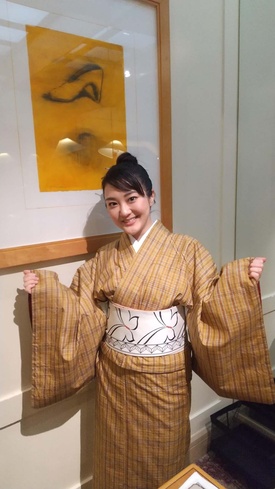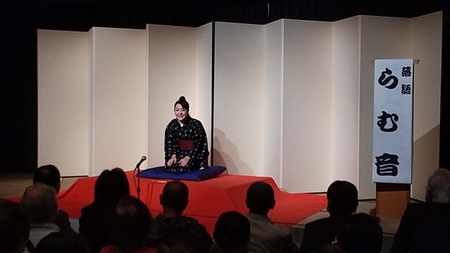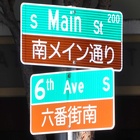Vibrant
Although there are not many attempts to perform rakugo in English, it seems to have become established by Japanese and foreigners alike. However, Ramune (29) is probably the only female rakugo performer who can perform rakugo in Japanese, English and Portuguese.
Ramune, a Japanese-Brazilian rakugo performer who has recently been featured frequently in the media, has a second-generation Japanese-Brazilian father and a third-generation Japanese-Brazilian mother.
Ramune, whose Japanese name is Mogi Ayane and Brazilian name is Bruna, has been studying under her master Lovehei for six years and is currently based in Yokohama. Last fall, she was promoted from a junior comedian to a "futatsume" comedian. Lovehei's master was the first Sanpei Hayashiya, known as the "King of Laughter" not only in the world of Rakugo in the Showa era but also in the world of comedy entertainment. He was a legendary comedian known for his shaggy hair, unconventional performances, and gags such as "Doumo, sumimasen!"
Perhaps because she follows this tradition, Ramune's performance is lively and unconventional, sometimes jumping up and down to the rhythm of samba on stage. Her carefree smile and crisp speech draw the attention of the audience. Although this is sometimes seen as a unique characteristic of "Japanese Brazilians," for the same reason, she has actually struggled since she was a child.
Am I a fool?
His paternal grandfather was from Gunma Prefecture and emigrated to Manaus, a city in the Amazon rainforest of Brazil, in the 1950s, while his paternal grandmother was from Aomori Prefecture and emigrated with her family to Tomé-Açu, in the northern Brazilian state of Pará.
On the other hand, my maternal great-grandfather was from Okinawa Prefecture and moved to Bolivia around 1900, and my maternal great-grandmother was from Kumamoto Prefecture and moved to Brazil.
Although her roots all lead back to Japan, her father, Shinji Mogi, and mother, Harumi Mogi, were both born and raised in Brazil. After Japan's immigration laws were revised in 1990, her father moved to Japan in search of work, and Ramune was born there.
Although they lived in Yokohama, Portuguese was spoken at home, and Ramune had no opportunities to come into contact with Japanese, so she struggled with the language when she was young. Her parents were no exception.
"I was fine when I was playing, but because I didn't understand the language, I couldn't learn games or piano, and I couldn't keep up with my studies. I didn't realize that this was because of the environment I grew up in, so I thought I was stupid. People around me also thought I was stupid because I looked Japanese."
I also have some sad memories.
"When I was in kindergarten, I used to bring my lunch to school, but while everyone else's lunch boxes were heated at the kindergarten, mine was cold. The thing is, my lunch had salad and fruit in it, and they had to keep those things separate in order for it to be heated. But even when my mother was informed of this, she couldn't read Japanese, and I couldn't explain it to her...
My mother later found out about this and cried, saying how terrible it was. The teacher at the time knew that I was of Japanese Brazilian descent, but he wasn't very kind or had no sense of service."
However, there were also teachers who understood Ramune's situation.
"When my teacher in the third grade had letters to send home, she wrote furigana readings only for my letters. I still go out to eat with that teacher."
Turning complexes into laughter
Ramune says that due to the language barrier, she began to dislike studying throughout elementary, middle, and high school.
"People around me would jokingly tell me to go back to Brazil, or ask me why my parents spoke such strange Japanese. But what I thought was amazing about my parents was that at a sports day in elementary school, a friend said that my father's Japanese was strange, and he replied, 'Actually, I'm an alien.' This made him popular instead. I tried to turn my negative aspects into laughs by pretending to be a fool. But this didn't work out for some of my Japanese friends, and some of them became delinquents."
From design to theater and rakugo
She studied design at Musashino Art University, but while working as an intern at a television production company in Los Angeles, she appeared on a cooking show and became interested in acting. After returning to Japan, she left the design path and became a stage actress, wanting to pursue a path of self-expression.
However, after meeting Lovehei in 2016, he became fascinated with the charm of rakugo.
"Unlike theater, with rakugo you can perform anything by yourself with just a cushion. I thought that was interesting. When I saw my master's rakugo, I thought it was amazing that he could move people's hearts all by himself."
He was nervous because he didn't fully understand the Japanese language and culture, but for some reason the plot of rakugo made sense to him. "Okay, I'll give it a try," he thought, and the following year he became Lovehei's apprentice.
Of course, from a Brazilian perspective, she was sometimes confused by the humor in rakugo. For example, in Japanese comedy, there is a part where the performer hits someone on the head, but in Brazil, this is taboo, so she tries to refrain from doing so.
In addition, in Japan, soba noodles are eaten by slurping, but in Brazil this is considered bad manners, so Ramune and her family disliked slurping.
"But there is a rakugo piece called 'Toki Soba,' and I had to be able to do that, so I practiced really hard. Now I can slurp and eat as fast as anyone. But when I perform 'Toki Soba' for overseas audiences, I make sure to explain to them in advance that 'slurping and eating is Japanese culture.'"
Comedy that no one else does
Although he is originally fluent in Portuguese, he studied English thoroughly during his student days, and during the COVID-19 pandemic, he streamed an online performance of "Jugemu" in English for an audience in New York. In Japan, he has also performed rakugo in Portuguese and Japanese for Japanese-Brazilian children, and shared his experiences with international students and their teachers in Japan.
"When I applied to go to Musashino Art University, people around me told me it was impossible, but I told them I'd never know until I tried, and that no matter what people say, it's fun to try."
There are still many things I want to do and goals I want to achieve.
"Performing rakugo whilst skydiving. I'm actually planning to do one in June. I'd also like to do a street rakugo performance. Maybe how many times I could say 'Jugemu, Jugemu...' in an hour. It would also be fun to just stand up and suddenly start doing rakugo. I want to be someone who makes people laugh just by mentioning my name, like my predecessor, the 'great master' Hayashiya Sanpei, and I want to make lots of people smile by doing things that no one else does."
He also shows enthusiasm for multicultural coexistence and international activities.
"I myself had complexes about the language and have had various experiences, so I would like to convey my experiences to children who are struggling with the language and people who have come from overseas to study, and to show them how hard I am working, so that they can feel encouraged. If I can do the Ram sound, then everyone can do it too."
The planned performance in Brazil was canceled due to the COVID-19 pandemic. He said he would like to perform in Brazil again in the near future. (Titles omitted)
* * * * *
YouTube: Rakugoka Ramune Channel RAMUNE
Inquiries: Office Hira (Representative: Mari Sasaki, rakugo.offices.hira@gmail.com )
© 2023 Ryusuke Kawai








